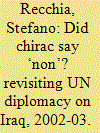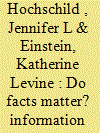| Srl | Item |
| 1 |
ID:
143150


|
|
|
|
|
| Summary/Abstract |
THE STANDOFF BETWEEN THE UNITED STATES and France leading up to the 2003 Iraq War probably “led to the most serious deterioration of transatlantic relations in recent memory.”1 According to a prominent view first advanced by American and British officials and subsequently taken up by academic analysts, President George W. Bush and Prime Minister Tony Blair made an all-out effort to secure United Nations (UN) approval before invading Iraq, but French president Jacques Chirac's public veto threat on 10 March 2003 doomed that effort to failure.2 Put differently, France's determination to use the UN Security Council (henceforth SC or UNSC) as an instrument for “soft balancing” American power made UN approval unattainable.3
|
|
|
|
|
|
|
|
|
|
|
|
|
|
|
|
| 2 |
ID:
143149


|
|
|
| 3 |
ID:
143153


|
|
|
|
|
| Summary/Abstract |
IN RECENT YEARS, ALL OF THE MAJOR U.S. NATIONAL security agencies have conducted quadrennial strategy reviews.1 In 1996, the U.S. Congress mandated the conduct by the Defense Department of a Quadrennial Defense Review (QDR) that entails a “comprehensive examination” of U.S. defense strategy and policies, “with a view toward determining and expressing the defense strategy of the United States and establishing a defense program for the next 20 years.”2 Since then, U.S. policymakers have also launched quadrennial reviews in the U.S. intelligence community and at the Departments of Homeland Security and State. As of this writing, U.S. agencies have completed five QDRs, three Quadrennial Intelligence Community Reviews (QICRs), two Quadrennial Homeland Security Reviews (QHSRs), and two Quadrennial Diplomacy and Development Reviews (QDDRs).3 In addition, the Barack Obama administration has begun the first Quadrennial Energy Review, which is being led by the White House and Department of Energy.
|
|
|
|
|
|
|
|
|
|
|
|
|
|
|
|
| 4 |
ID:
143151


|
|
|
|
|
| Summary/Abstract |
ALTHOUGH APPROXIMATELY TWO-THIRDS OF the Latino electorate in the United States is Spanish speaking (bilingual or Spanish dominant),1 the independent impact of this demographic characteristic on voting and on participation in nonvoting campaign-related activities has been ignored by analysts and political activists alike. The objective of this article is to contribute to filling this void. Specifically, the article theorizes that non-English-dominant Latinos (bilingual and Spanish dominant) have access to Spanish-language media and social environments that make them more and differently informed about the U.S. political world than English-dominant Latinos. We use multivariate analytic techniques to measure the independent impact of language competence and find that the results of our analysis largely support our initial predictions. That is, we show that bilinguals and Spanish-dominant Latinos register and vote at rates equal to or higher than English-dominant Latinos or monolinguals who have access to resources that the major models of electoral behavior find predict high levels of political involvement.2 We also find that bilinguals participate in nonelectoral campaign activities at rates comparable to English-dominant Latinos.
|
|
|
|
|
|
|
|
|
|
|
|
|
|
|
|
| 5 |
ID:
143152


|
|
|
|
|
| Summary/Abstract |
ALONG WITH CHINA'S RISE IN MILITARY and economic capabilities, foreign policy crises involving China seem more likely, as seen in the diplomatic standoffs in the South China Sea and over the Diaoyu/Senkaku Islands. With the United States “rebalancing toward Asia,” diplomatic and military crises between China and its neighbors will inevitably involve U.S. interests in the Asia-Pacific.1 Therefore, it is imperative for policymakers in the United States and other nations to understand China's dynamic behavior in foreign policy crises—that is, when China will take risks to escalate a crisis and when China will avoid risks to seek accommodation during a crisis.
|
|
|
|
|
|
|
|
|
|
|
|
|
|
|
|